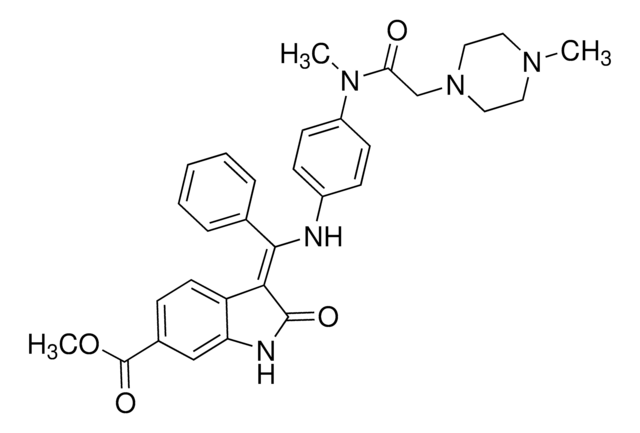SML3673
Lin28 inhibitor C1632
≥98% (HPLC)
Synonym(s):
Lin28 1632, Lin28 inhibitor I, Lin28-C1632, Lin28-let-7 antagonist 1, N-Methyl-N-[3-(3-methyl[1,2,4]triazolo[4,3-b]pyridazin-6-yl)phenyl]acetamide
Sign Into View Organizational & Contract Pricing
All Photos(1)
About This Item
Empirical Formula (Hill Notation):
C15H15N5O
CAS Number:
Molecular Weight:
281.31
MDL number:
UNSPSC Code:
12352200
NACRES:
NA.28
Recommended Products
Quality Level
Assay
≥98% (HPLC)
form
powder
color
, White to light Brown
solubility
DMSO: 2 mg/mL, clear
storage temp.
2-8°C
Biochem/physiol Actions
Compound 1632 (C1632) is a RNA-binding protein Lin28 inhibitor that prevents Lin28-mediated inhibition of let-7 microRNA (miRNA) maturation by blocking Lin28 interaction with let-7 miRNA precursor (IC50 = 8 μM by ELISA using truncated pre-let-7a-2). C1632 specifically upregulates Huh7 cellular let-7a/g/f miRNA, but not RNU44 snoRNA (60 μM for 48h), inhibits the stemness and induces differentiation of mouse embryonic stem cells (mESCs, 20 μM for 48h), as well as inhibits the proliferation and stem-like properties of human cancer stem cells (CSCs) in 22Rv1 and Huh7 cultures (IC50 20-42 μM).
Storage Class Code
11 - Combustible Solids
WGK
WGK 3
Flash Point(F)
Not applicable
Flash Point(C)
Not applicable
Certificates of Analysis (COA)
Search for Certificates of Analysis (COA) by entering the products Lot/Batch Number. Lot and Batch Numbers can be found on a product’s label following the words ‘Lot’ or ‘Batch’.
Already Own This Product?
Find documentation for the products that you have recently purchased in the Document Library.
Martina Roos et al.
ACS chemical biology, 11(10), 2773-2781 (2016-10-22)
New discoveries in RNA biology underscore a need for chemical tools to clarify their roles in pathophysiological mechanisms. In certain cancers, synthesis of the let-7 microRNA tumor suppressor is blocked by an RNA binding protein (RBP) Lin28, which docks onto
Jing-Yi Chen et al.
Journal of cellular and molecular medicine, 26(2), 422-435 (2021-12-17)
Chemoresistance and migration represent major obstacles in the therapy of non-small-cell lung cancer (NSCLC), which accounts for approximately 85% of lung cancer patients in clinic. In the present study, we report that the compound C1632 is preferentially distributed in the
Our team of scientists has experience in all areas of research including Life Science, Material Science, Chemical Synthesis, Chromatography, Analytical and many others.
Contact Technical Service